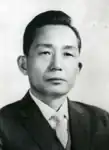| |||||||||||||||||
| |||||||||||||||||
 Map of pluralities won in provinces and cities: ■ – Park Chung Hee ■ – Yun Posun | |||||||||||||||||
| |||||||||||||||||
Presidential elections were held in South Korea on 3 May 1967.[1] The result was a victory for Park Chung Hee, who won 51.4% of the vote. Voter turnout was 83.6%.[2]
Nominations
Military
The Democratic Republican Party National Convention was held on 2 February and President Park Chung Hee was nominated as its presidential candidate without a vote.[3]
Civilian
In May 1965 the two largest opposition parties in the parliament, former president Yun Posun's Civil Rule Party (CRP) and stateswoman Park Soon-cheon's Democratic Party (DP), joined to create the People's Party (PP), forming a united opposition against President Park Chung Hee's military dictatorship.
However, in 1965 the radical wing of the People's Party led by Yun left the party, later forming the New Korea Party (NKP) in 1966. The NKP and nominated Yun for president. The remaining members of the People's Party, the moderates led by Park Sang-cheon, nominated former president of Korea University Yu Jin-oh.
Fearing that running two candidates to represent the civilian field might result in Park winning easily, the two parties decided to join forces and created the New Democratic Party (NDP) on 7 February, agreeing to nominate Yun as its candidate.[4][5]
Results
| Candidate | Party | Votes | % | |
|---|---|---|---|---|
| Park Chung Hee | Democratic Republican Party | 5,688,666 | 51.44 | |
| Yun Posun | New Democratic Party | 4,526,541 | 40.93 | |
| Oh Chaeo-yong | United Korea Party | 264,533 | 2.39 | |
| Kim Chun-yon | People's Party | 248,369 | 2.25 | |
| Chon Chin-han | Korea Independence Party | 232,179 | 2.10 | |
| Lee Se-chin | Justice Party | 98,433 | 0.89 | |
| Total | 11,058,721 | 100.00 | ||
| Valid votes | 11,058,721 | 94.96 | ||
| Invalid/blank votes | 586,494 | 5.04 | ||
| Total votes | 11,645,215 | 100.00 | ||
| Registered voters/turnout | 13,935,093 | 83.57 | ||
| Source: Nohlen et al. | ||||
By-province
| Province or city | Park Chung Hee | Yun Posun | Oh Jae-young | Kim Jun-yeon | Chun Jin-han | Lee Se-jin | Total | |||||||
|---|---|---|---|---|---|---|---|---|---|---|---|---|---|---|
| Votes | % | Votes | % | Votes | % | Votes | % | Votes | % | Votes | % | |||
| Seoul | 595,513 | (45.2%) | 675,716 | (51.3%) | 11,447 | (0.9%) | 13,142 | (1.0%) | 14,242 | (1.1%) | 7,635 | (0.6%) | 1,317,695 |  |
| Gyeonggi | 525,676 | (41.0%) | 674,964 | (52.6%) | 22,383 | (1.7%) | 23,248 | (1.8%) | 25,306 | (2.0%) | 11,029 | (0.9%) | 1,282,606 |  |
| Gangweon | 429,589 | (51.3%) | 349,807 | (41.7%) | 18,211 | (2.2%) | 17,757 | (2.1%) | 15,400 | (1.8%) | 7,310 | (0.9%) | 838,074 |  |
| Chungnam | 489,516 | (45.4%) | 505,076 | (46.8%) | 17,662 | (1.6%) | 27,295 | (2.5%) | 28,809 | (2.7%) | 10,560 | (1.0%) | 1,078,918 |  |
| Chungbuk | 269,830 | (46.6%) | 252,469 | (43.6%) | 15,058 | (2.6%) | 14,526 | (2.5%) | 20,345 | (3.5%) | 7,114 | (1.2%) | 579,342 |  |
| Jeonnam | 652,847 | (44.6%) | 682,622 | (46.6%) | 42,249 | (2.9%) | 46,721 | (3.2%) | 28,156 | (1.9%) | 11,774 | (0.8%) | 1,464,369 |  |
| Jeonbuk | 392,037 | (45.0%) | 451,611 | (51.9%) | 21,527 | (2.5%) | 23,945 | (2.8%) | 28,943 | (3.3%) | 8,325 | (1.0%) | 870,344 |  |
| Busan | 338,135 | (64.2%) | 164,077 | (31.2%) | 9,922 | (1.9%) | 6,866 | (1.3%) | 4,556 | (0.9%) | 3,028 | (0.6%) | 526,584 |  |
| Gyeongnam | 838,426 | (68.6%) | 281,545 | (23.0%) | 45,325 | (3.7%) | 30,740 | (2.5%) | 16,065 | (1.3%) | 9,895 | (0.8%) | 1,221,996 |  |
| Gyeongbuk | 1,083,939 | (64.0%) | 447,082 | (26.4%) | 56,328 | (3.3%) | 40,884 | (2.4%) | 45,482 | (2.7%) | 19,647 | (1.2%) | 1,693,362 |  |
| Jeju | 73,158 | (56.5%) | 41,572 | (32.1%) | 4,421 | (3.4%) | 3,245 | (2.5%) | 4,875 | (3.8%) | 2,116 | (1.6%) | 129,387 |  |
References
- ↑ Dieter Nohlen, Florian Grotz & Christof Hartmann (2001) Elections in Asia: A data handbook, Volume II, p420 ISBN 0-19-924959-8
- ↑ Nohlen et al., p464
- ↑ "e영상역사관 » 영상보기". www.ehistory.go.kr (in Korean). Retrieved 2018-04-21.
- ↑ "민중당(民衆黨) - 한국민족문화대백과사전". encykorea.aks.ac.kr (in Korean). Retrieved 2018-04-21.
- ↑ "신민당 통합창당|대통령후보 윤보선·당수 유진오씨". 중앙일보 (in Korean). 1967-02-07. Retrieved 2018-04-21.

